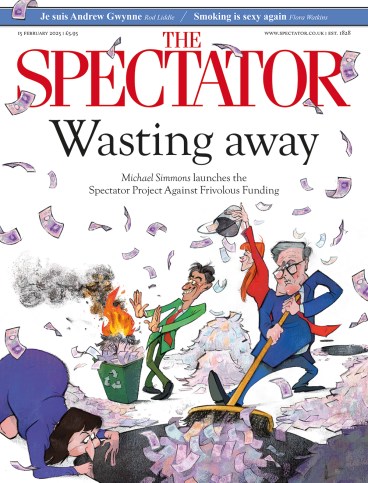
The Chancellor’s appeal to regulators last month for suggestions to boost growth was mocked as evidence that the government itself is hopelessly bereft of ideas. Might as well ask traffic wardens to devise urban regeneration schemes, we scoffed, or food safety inspectors to plan state banquets. But it made sense to the extent that smarter regulation really should have the potential to boost economic activity – and there are signs the message has got through.
Bank of England governor Andrew Bailey speaks of using Brexit freedoms to shield smaller UK banks from ‘Basel rules’ that would require them to hold larger reserves. The Financial Conduct Authority chief Nikhil Rathi has been trimming his sails faster than an Olympic yachtsman on issues such as anti-money-laundering checks on smaller transactions. Abby Thomas and Baroness Manzoor have suddenly left their respective jobs as chief executive and chair of the allegedly too claimant-friendly Financial Ombudsman Service. And Marcus Bokkerink is no longer chair of the Competition and Markets Authority, following a reportedly ‘underwhelming’ CMA submission in response to Rachel Reeves’s call for every regulator to help ‘tear down barriers to growth’.
Not so hopeless after all? Bear in mind that where ministers foresee a pragmatic regulatory regime ‘supercharging the economy with pro-business decisions’ (to quote the Business Secretary Jonathan Reynolds), doubters fear a dangerous watering-down of protections. I hope Reeves remembers the zenith of Labour’s previous embrace of light-touch City oversight in the interest of competitiveness. It can be dated to 5 April 2004, when she was a fresh-faced Bank of England trainee and her predecessor Gordon Brown was visiting a new tower in Canary Wharf to congratulate its trading-floor denizens on ‘the contribution you and your company make to the prosperity of Britain’. Their company, doomed to self-destruct with global collateral damage, was Lehman Brothers.
Frankly why bother
Attention focused this week on what the Telegraph headlined the ‘Worst jobs slump since Covid’, as data from KPMG and the Recruitment and Employment Confederation showed falls in permanent and temporary job vacancies at the fastest pace since mid-2020, while the number of ‘payrolled’ employees also decreased in December by 47,000, again the biggest drop since 2020. This is no surprise when the government has whacked up employers’ national insurance and increased the minimum wage, along with costly new workplace regulations.
But more worrying still, I suggest, are ONS figures on ‘business creations’ which illuminate the mood among start-up risk-takers who truly hold the keys to growth. In the fourth quarter of last year, just 65,450 new businesses were registered, the lowest number since the data series began in 2017; it is also 8.5 per cent down on Q4 2023, and fewer than the corresponding number of ‘business closures’, at 69,435. While Westminster–watchers track the surge of Reform, the rising force in entrepreneur circles is one first spotted by this column shortly after the Chancellor’s October Budget: I call it the frankly-why-bother party.
Blocked pots
A belated gong xi fa cai to Chinese foreign minister Wang Yi, due in London this week for a round of ‘UK-China strategic dialogue’ – a forum that has been in abeyance since 2018 as relations have deteriorated, not least because of suppressions of freedom in Hong Kong. The traditional Lunar New Year greeting translates as ‘wishing you wealth’, and in that spirit I hope Wang Yi surprises his British interlocutors by announcing a relaxation of Beijing’s vengeful stance towards UK-resident emigrés from Hong Kong, who have been blocked from withdrawing their pension pots from the territory’s Mandatory Provident Fund.
Permanent leavers can, in theory, take accumulated MPF holdings with them if they provide evidence of right of abode outside Hong Kong. Since 2021, many thousands have sought sanctuary here on British National (Overseas) passports, which Boris Johnson’s government decreed would entitle them to fast-track settlement. But the Chinese authorities retorted by refusing to recognise BNO status – and the MPF, for which banks including HSBC and Standard Chartered act as custodians, used that reason to bar BNO holders from cashing out until they reach the age of 65.
The upshot is that HSBC, a FTSE 100 company headquartered in London, is sitting on almost £1 billion owed to UK residents separated from their savings, perhaps for decades to come, by what’s now widely seen as a hostile foreign power. HSBC’s defence is that this is a matter of law in which it has no discretion. If Wang wants to look a little less hostile in order to gain a reciprocal trade advantage, I’m sure he could have the law changed in a click of his fingers.
Asil’s gold pen
I’ve admitted this before but it’s still embarrassing: Asil Nadir gave me a gold pen. When I was working in Hong Kong in the late 1980s, the Turkish Cypriot tycoon whose Polly Peck conglomerate was one of the hottest stocks of that decade threw a party at the Mandarin, the territory’s premier hotel, and his bag-carrier, a former colleague of mine, slipped my name onto the guest list. I shook Nadir’s limp hand, drank his champagne and left with a boxed gift that turned out to be an elegant Cross ballpoint.
But I stopped using it when his reputation shifted from playboy dealmaker to suspected (and later convicted) mega-fraudster – and I gave it to a barman called Liu at a railway halt on the Chinese-Mongolian border. Nadir, who died this week, perhaps now finds himself in a rather hotter waiting room. But a good pen should never go to waste, so I hope it’s still clipped in the front pocket of Mr Liu’s white jacket.








Comments